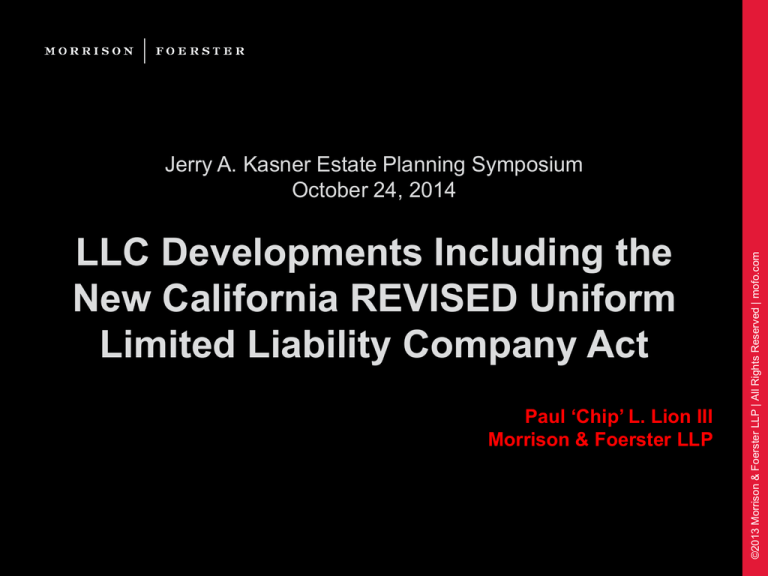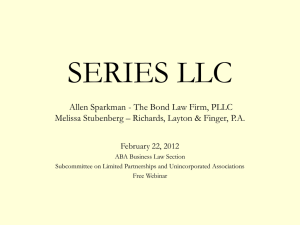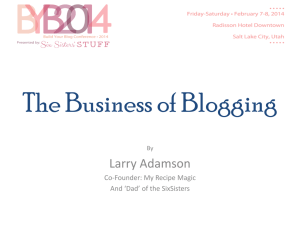
LLC Developments Including the
New California REVISED Uniform
Limited Liability Company Act
Paul ‘Chip’ L. Lion III
Morrison & Foerster LLP
©2013 Morrison & Foerster LLP | All Rights Reserved | mofo.com
Jerry A. Kasner Estate Planning Symposium
October 24, 2014
Source & Background Materials
1. Beyond Transfer Taxes: What Every Estate Planner Should
Know about Partnerships, 2009 Kasner Symposium
2. LLC Developments including the New California RULLCA – A
Comparison of the Beverly-Killea Limited Liability Company
Act and California Revised Uniform Limited Liability Company
Act
3. Professor Elizabeth Miller, Selected Recent LLC Cases, ALI
CLE Limited Liability Entities 2014 Updated, March 24, 2014;
http://www.baylor.edu/law/faculty/index.php?id=75536
2
Background
•
California’s first LLC Act became effective September 30, 1994 and was known as the Beverly-Killea Limited
Liability Company Act (sometimes referred to herein as the “Old Act”).
•
Uniform Law Commission (fka the National Conference of Commissioners on Uniform State Laws (“NCCUSL”)
approved the Revised Uniform Limited Liability Company Act (“REULLCA”) in July, 2006.
•
The California Revised Uniform Limited Liability Company Act (“CRULLCA”) was codified at California
Corporations Code §§17701.01 et.seq. and became effective beginning on January 1, 2014 and the original
California Act was repealed.
•
•
•
Generally CRULLCA applies to all LLCs existing on or after 1/1/2014 and to acts or transactions by
members and managers occurring or contracts entered into by the LLC or by members or managers on
or after 1/1/2014
Prior law governs all acts or transactions by members or managers or contracts entered into by the LLC
or by the members or managers prior to 1/1/2014. §17713.04
• An LLC operating agreement is a contract, so prior law should apply to that operating agreement.
• If a contract (or operating agreement) is amended, does CRULLCA apply only to the amendment?
CRULLCA is based on REULLCA. Many of the Sections in CRULLCA correspond to the Sections in REULLCA
(e.g., CRULLCA §17704.01 is §401 in REULLCA). Good to know when researching relevant comments
3
Formation
•
LLC may be formed by any person who need not be a member. §17702.01
•
Articles of Organization (Form LLC-1) filed with SOS. The Old Act §17051(c) included a non-exclusive list of items that
could be included in the articles. In those days, draftsmen might have included a litany of powers in case third parties
question the authority (ultra vires) of the LLC to do certain things. CRULLCA no longer contains the list, but nothing
precludes adding inclusion in AO today.
•
As with California’s original act, but a departure from REULLCA, the organizer must designate whether the LLC is to be
manager-managed or member-managed.
•
Member-managed LLC, every member is an agent of the LLC and has apparent authority to bind. §17703.01
•
In a manager-managed LLC, the member has no authority and each manager is an agent of the LLC and has
apparent authority to bind
•
The designation will also determine who owes fiduciary duties
•
If there is a conflict between the operating agreement and the Articles of Organization and other filings with the SOS,
the operating agreement prevails vis a vis members, dissociated members, transferees and managers, and the latter
prevails as between other persons if so relied. §17701.12(d). DIFFERENT from Old Act which provided Articles of
Organization control.
•
What if check box as manager-managed, but operating agreement is member-managed? Which prevails?
•
NOTE: If the LLC has no members for 90 consecutive days, the LLC is dissolved. If a person registers an LLC on the
“shelf” and does not admit a member within 90 days thereafter, the organizer must file a certificate of dissolution and
certificate of cancellation. Note 17704.01(b), more than one member agrees “before” formation of the LLC and the
organizer acts on their behalf. Seems difficult not to meet the 90 day test.
•
When rendering “due formation” opinions, the opinion giver needs assurances that the members were admitted
within 90 days after formation. Seems that if the LLC were ever a single member LLC, that is the only risk.
4
Operating Agreement
•
•
Certain provisions may only be varied by a written operating
agreement.§17701.10(d)
• Information that must be maintained by an LLC. §17701.13 (but note,
rights to inspect such information under §17704.10 may not be varied)
• Management and voting rights of members and managers. §17704.07
• Fiduciary duties of managers may be modified only by a written
operating agreement with informed written consent of the
members.§17701.10(e).
• Note: A new members assenting to the terms of an operating
agreement is not informed consent.
• Note: Under statute only modification of Manager’s fiduciary duties
require informed written consent, not modification of Members
fiduciary duties in a member-managed LLC.
NEW: Operating Agreement may require certain actions to be approved by
non-parties to agreement. §17701.12(a). (e.g., can’t amend the agreement
or dissolve the LLC without the lender’s approval)
5
Operating Agreement (cont.)
•
•
Operating Agreement MAY NOT:
• Eliminate the duty of loyalty, the duty of care and any other fiduciary duty of member in
member-managed LLC and manager in a manager-managed LLC, except:
• Can identify certain activities that do not violate duty of loyalty, if not manifestly
unreasonable
• Can specify a % of members who can authorize a specific act that otherwise violates
duty of loyalty. §17704.09
• Can reduce duty of care, but not unreasonably
• Eliminate the obligation of good faith and fair dealing, but may prescribe standards by which
performance of the obligation is measured
• Unreasonably restrict the duties and rights to information set forth in §17704.10
• Note: LLC with more than 35 members is entitled to more financial information. Foreign
LLCs with up to 25% of members residing in California are entitled to information and
inspection rights provided in §17704.10. §17708.08
• Note: can members right to information under §17704.10 be restricted? What about a
member who is a competitor? (see §17701.10(d)
Unclear whether agency authority of member in member managed LLC may be eliminated.
17701.10(d) seems to suggest that as between the members, the agency authority of 17703.01
cannot be varied.
6
Members
•
•
•
•
•
NEW: Unlike Old Act where the consent of a majority of members was required to
admit a new member, under CRULLCA §17704.01(c ), the default consent is all the
members. Accordingly, the operating agreement must specify the required vote to
admit a new member if it will be less than all of the members.
NEW: Similar to the Delaware Act, CRULLCA permits “non-economic members”.
This was not the case under the Old act.
Old Act had an affirmative statement that Members can lend money or transact
business with LLC and have the same rights as non-members (similar to RULPA) –
not in CRULLCA, but not prohibited.
Under Old Act, the successor or legal rep. of a dissolved or terminated Member
exercises the power of a member. CRULLCA doesn’t have these provisions.
If fiduciary duties under an operating agreement are varied (which is often the case)
to be effective against a transferee member who is admitted as a member, a mere
assent to the terms of the OA are not sufficient to constitute “Informed written
Consent” §17701.10(e). OA should condition transfers on transferee making an
informed consent to varied fiduciary duties.
7
Contributions
•
•
•
•
Default in Contributions. Unlike the Old Act, CRULLCA does not list the possible penalties that
may be permitted when a member fails to make a contribution.
• Old Act - In response to two California cases as to the enforceability of cram down default
provisions, §17201(a) of Old Act listed 5 remedies, including eliminating interest in LLC, but
subject to reasonableness standard, with burden of proof on member seeking unenforcement
• CRULLCA contains affirmative policy statement of “freedom of contract” §17701.07
No Excuses. §17704.03 states that a member is not excused from making a contribution because
of “death, disability, or other inability to perform personally.” There is a negative inference that a
Member is excused if he chooses not to, but is able to, pay. That is nonsense. Note under
Beverly-Killea §17201, the member was not excused from making a contribution “because of
death, disability, dissolution, or any other reason” which includes inaction
• Note: add to the OA that a member is not excused from contributing for any reason.
Definition of Contributions. This may be important because under 17704.04 distributions are
made on the basis of the value, as stated in the required records when the LLC decides to make
the distribution, of the contributions the LLC has received from each member.
• §17701.02 defines “contribution” as “any benefit” provided by a person to an LLC.
• Beverly-Killea defines contribution as “money, property, or services rendered, or a promissory
note or binding obligation to contribute…”
Could there be confusion as to the value of “any benefit”?
8
Distributions
•
•
•
•
NOTE—there is no provision providing for allocation of profits and losses among LLC
Members – important to include in operating agreement
17704.04 distributions are made on the basis of the value, as stated in the required records
when the LLC decides to make the distribution, of the contributions the LLC has received
from each member.
Assets in kind may be distributed if fungible with each other part and each person receives
a percentage of the asset equal in value to the person’s share of distributions. Old Act
prohibited distribution of any asset in kind save for dissolution.
Wrongful Distributions. §17704.05. Same as Old Act, (must be able to pay debts, assets
must equal or exceed liabilities) under Old Act not clear if redemptions were treated as
distributions and whether had to run solvency analysis.
• §17704.06. Members of member-managed LLC who consent to a distribution not
authorized and managers of manager-managed LLC who consent to a distribution not
authorized are liable for the amount of the distribution that exceeds the amount that
could have been distributed without violation.
• Note, in a member-managed LLC, certain members can be relieved of liability for
wrongful distribution (unless they knew it was wrongful) if the authority and
responsibility for distributions is delegated to other members.
9
Fiduciary Duties
•
Old Act (§17153) and New Act (§17704.09) both provide generally that the fiduciary duties
of managers of a manager-managed LLC and members of a member-managed LLC are
the duties of loyalty and the duty of care.
• Old Act referred to Partnership Law to define fiduciary duties:
• §16404(b) – Duties of loyalty “includes” accounting for LLC assets and noncompetition
• §16404(c) – Duty of care – refrain from acting in a grossly negligent manner
•
CRULLCA §17704.09(a),(b),(c) enumerate fiduciary duties, generally the same as Old
Act except the definition of duties of loyalty is “limited” to the enumerated actions. Note
however that unlike RUPA, the lead in language does NOT state that these are the
“only” fiduciary duties and California courts have held that the court can find other
fiduciary duties. See Enea v. Superior Court (6th Dist. 2005) 132 Cal. App. 4th 1559
•
•
•
CRULLCA §17701.10(c)(4) – cannot eliminate fiduciary duties
Obligation of good faith and fair dealing applies to members and managers under both Acts
CRULLCA §17704.09(f)(3) provides that except as otherwise provided (i.e., a membermanaged LLC) a member does not have any fiduciary duty to the LLC or to any other
member solely by reason of being a member. OLD Act was silent as to member’s duties in a
manager-managed LLC.
10
Transfer of Interests
•
Old Act §17301: Unless otherwise provided, an “economic interest” (i.e., right to share income,
gains, loses and receive distributions – no management rights or voting rights) can be assigned in
whole or in part. A “membership interest” (i.e., rights to inspect books and records, rights to
participate in management and vote) is not assignable without consent of a majority in interest of
members (i.e., more than 50% of the interests of members in current profits).
•
CRULLCA §17705.01: A “transferable interest” (i.e., right to distributions) can be transferred (i.e.,
assigned, encumbered, etc.) and such transfer does not entitle the transferee to management
rights (note, nothing about voting rights) or access to books and records.
•
Unlike the Old Act, CRULLCA does not contain any provision that expressly states that a member
cannot transfer its membership interest other than a transferrable interest. Note, §17704.01(c)
provides as a default that a person can only be a member with the consent of all the members.
•
Right to Withdraw:
• Old Act: Permitted to withdraw, notwithstanding any restriction in the OA to the contrary
• CRULLCA: A member may “dissociate” at any time, but does not contain language that the
right applies notwithstanding a restriction against “dissociation”
11
Questions
• Should/must attorneys review clients’ existing LLC agreements
to update operating agreements under new CA LLC Act? What
unexpected results could be triggered?
•
•
•
•
There are no transition rules like the 1983 California Revised Limited Partnership
Act that applied the new law to existing LPs after a period of years or a
significant change in the policy behind LLCs.
LLC Acts are generally default statutes, so if the operating agreement adequately
addresses those matters that might otherwise be altered by statute, no need to
change
While the default fiduciary duty includes “limiting” language under the definition of
the duty of loyalty, there is still no limiting language in the lead-in to defining
fiduciary duties.
Because amendments may cause all or a portion of the operating agreement to
be governed by RULLCA (see §17713.04(b)) attorneys may want to amend
assignment clauses to require “informed consents” to duties that are deemed to
modify fiduciary duties.
12
Questions
•
I generally create DE LLCs given that their statutes tend to be
progressive and have well-developed law on entity issues. Why would
I choose to create CA LLC vs. DE LLC? If I create a DE LLC and
specify DE governing law, are there still instances where CA LLC law
overrides? As to governance? Creditors’ rights and “piercing the
veil”?
•
CRULLCA §17708.01: Laws of state under which foreign LLC is formed governs:
•
•
•
•
The organization of the LLC, its internal affairs and authority of its member and managers
Liability of a member as member or manager as manager for debts, obligations or other liabilities of
LLC
Elimination or Wavier of Fiduciary Duties More Likely Respected with DE LLC. CRULLCA
does not permit the elimination of duty of loyalty or duty of care, and modifications can’t be
manifestly unreasonable. Del. permits elimination of fiduciary duties. §18-1101(c). Further, It
is the policy of Del. LLC Act to give the maximum effect to the principle of freedom of contract
and to the enforceability of limited liability company agreements. Delaware courts respect
terms of contract.
Many CRULLCA provisions cannot be modified, or can only be modified in writing.
§17701.10
13
Questions
•
Actual Authority v. Apparent Authority. DE does not have statutory apparent
authority
•
Entity Veil Piercing less likely with DE LLC. Calif. codifies common law principle
of member alter ego liability. Risk if provide for meetings and not held.
•
•
See Bronstein v. Crowell, Weedon & Co., No. B191738, 2007 WL 969559 (Cal App. 2 Dist. April 3, 2007) where the
plaintiff sought to pierce the veil of a Delaware LLC and hold a 30% owner liable under an alter ego doctrine. The
court noted the application of the alter ego doctrine to LLCs under the California LLC statute and stated that the alter
ego doctrine is also available to Delaware LLCs. The court stated that the liability of members of a foreign LLC is
governed by the law of the state of formation under California law. The Court concluded that the plaintiffs failed to
present evidence raising a triable issue of fact as to whether a 30% owner of the LLC was liable under the alter ego
doctrine, finding that the owner’s alleged concealment of his ownership in the LLC was insignificant in as much as a
30% interest is insufficient to make a controlling decision in a Delaware LLC. Unfortunately, some courts have
gotten it wrong and limited the state law to govern the “internal affairs” and not a member’s liability to third parties,
notwithstanding the statute’s language. See Butler v. Adoption Media, LLC, 486 F. Supp 3d 1002 (N.D. Cal. 2007)
where the court applied California law and not Arizona law to determine whether Arizona LLCs doing business in
California were the alter egos of the individual members.
California Long Arm: CRULLCA §17708.08 provides that if 25% of voting
interests of members in foreign LLC reside in CA, then those members are
entitled to inspection rights provided in §17704.10
14
Questions
• We create Series LLCs for families that are managing private
investment pools and want to have different asset classes, etc.
Does the CA LLC Act accommodate creation of series? If no,
why not? What are the pros and cons of Series LLCs?
•
Like REULLCA, CRULLCA does not authorize “Series LLCs”. The original Bill introduced in 2011
included provisions for the creation of a Series LLC (Article 12), but those provisions were
dropped from the Bill at the request of the SOS on grounds that the series provide “additional veils
of secrecy to the LLC assets and liabilities,” which “could create an avenue for an LLC to avoid
legitimate responsibilities to third parties and/or members.” Senate Judiciary Committee, CA 2012
legislative law case history. The drafting committee for REULLCA’s reasons for not including
Series LLCs in REULLCA included lack of recognition of series under bankruptcy law and whether
states would respect the internal shields of series when such states do not recognize series.
•
Nevertheless, The California FTB has stated its position that each component series of a Series
LLC, “for example a Delaware Series LLC,” is a separate LLC and must file its own form 568, and
pay its own separate LLC annual tax and fee if it is registered or doing business in CA, and if (1)
the holders of interests in each series are limited to the assets of that series upon redemption,
liquidation or termination, and may share in the income only of that series, and (2) under formation
state law, the payment of the expenses, charges, and liabilities of each series is limited to the
assets of that series. California 2012 Limited Liability Company Tax Booklet
15
Questions
• Benefits and Risks of Series LLCs Compared to Multiple LLCs
• Benefits:
•
•
•
•
Single registration under ICA of 1940
Shield against piercing- A Series LLC statute effectively instructs courts to keep the liability
separate.
Fee savings (though not necessarily in California)
Risks:
•
•
•
•
•
•
Lack of certainty regarding the legal treatment of the series (i.e., effectiveness of internal
liability shield in a foreign state that does not itself have series legislation).
Unanswered questions under proposed IRS regulations
Open state tax issues (i.e., DE will not issue good standing cert. for a separate series.
Non-tax open issues- can a separate series file a BK petition separate and apart form the
LLC?
Absence of case law.
How are assets to be titled?
16
Questions
•
CRULLCA also did not adopt low-profit limited liability company provisions.”
(“the L3C legislation”)
•
The L3C is no better than any other business form for receiving program
related investments from private foundations. L3C legislation implies
otherwise and we believe is therefore misleading. Using a program related
investment as part of the type of tranched financing promoted by L3C
advocates portends serious risk of improper “private benefit” – i.e., using
charitable assets to the benefit of private interests such as for-profit
investors. “Private benefit” transactions are improper for a private
foundation and imperil a foundation’s tax-exempt status. A private
foundation cannot remain qualified as a tax-exempt charitable entity if the
foundation has transgressed the private benefit doctrine.
17
Questions
• Restrictions on transferability: clients often want to prohibit
transfers absolutely. Is this allowed under CA LLC law? Are
absolute prohibitions really enforceable?
•
•
•
See “Transfer of Interests” Slide above. Economic Interests/Transferable
Interests v. Membership interests
Nothing in CA law precludes amending the section of the Act that permits
assignment.
Complete prohibition will be strictly construed.
18
Questions
• How much latitude do parties have to override the CA LLC Act
default rules? The Act generally confirms that parties have
freedom to contract but are there statutory rules the parties
cannot modify?
•
See CRULLCA §17701.10 for a list of “default” sections that cannot be
varied, or can only be varied as provided in the Section, or can only be
varied in writing.
• §17701.13 – requirement to keep certain books and records “shall only
be varied by a written operating agreement,” but see §17713.07 where
LLCs face penalties for failing to keep books and records required by
1.13? See §17704.10 which provides every member (and holder of
transferable interest) right of inspection of the documents required to be
maintained in 1.13, which as for member’s such rights cannot be varied,
but see 1.10 which allow for reasonable restrictions on rights and duties
• Note, unless stated otherwise in OA, assignees have inspection rights.
19

![Your_Solutions_LLC_-_New_Business3[1]](http://s2.studylib.net/store/data/005544494_1-444a738d95c4d66d28ef7ef4e25c86f0-300x300.png)






